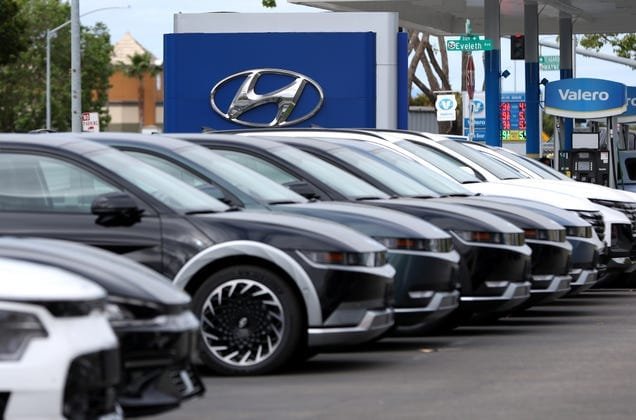Hyundai’s $21 Billion U.S. Investment: Transforming Supply Chains and Navigating Tariffs!

Hyundai’s $21 Billion U.S. Investment: Transforming Supply Chains and Navigating Tariffs!
Hyundai’s recent announcement regarding its monumental $21 billion investment in the United States marks a pivotal shift in the automotive landscape. As the industry evolves amid challenges like tariff complexities and supply chain disruptions, Hyundai’s strategic commitment promises to reshape the future of manufacturing and trade within North America.
Setting the Stage: A New Automotive Era
In recent years, the automotive sector has faced significant transformations driven by climate change initiatives, technological advancements, and shifting consumer preferences. Hyundai’s investment isn’t just financially substantial; it symbolizes a forward-thinking approach that aims to align with contemporary market demands.
- Environmental Considerations: With increased focus on sustainability, Hyundai’s push toward electric vehicles (EVs) plays a vital role in this investment.
- Supply Chain Optimization: The establishment of manufacturing facilities in the U.S. will mitigate reliance on overseas production, allowing for quicker response times to market demands.
- Job Creation: This investment is expected to create thousands of jobs, boosting the local economy while reducing unemployment rates.
Diving Deeper: Key Features of the Investment
The $21 billion investment signifies Hyundai’s commitment to building a robust industrial base in the United States, encompassing several key features:
- New Manufacturing Plants: The establishment of state-of-the-art manufacturing facilities, specifically focused on electric vehicles, positions Hyundai as a leader in the green automotive movement.
- Research and Development Hubs: Investment in R&D centers dedicated to future automobile technologies will solidify Hyundai’s innovative edge.
- Strengthened Supply Chain: By localizing production, Hyundai can streamline its supply chain, making it more resilient against global uncertainties.
Benefits of Hyundai’s Commitment
Hyundai’s investment heralds numerous benefits not only for the company but also for the broader community and economy:
- Enhanced Economic Growth: Local communities will feel the positive ripple effects through job creation and increased local spending.
- Technological Advancement: Collaborative projects with local universities and tech companies could lead to pioneering developments in both AI and EV technologies.
- Improved Trade Relations: Enhanced manufacturing capabilities can contribute to stronger U.S.-South Korea trade relations, navigating potential tariff challenges intelligently.
The Broader Implications: Navigating Tariffs and Supply Chain Challenges
Moreover, navigating tariffs is a complex yet crucial aspect of this investment plan. With rising tensions in global trade, particularly between the U.S. and other nations, Hyundai’s commitment can be seen as a proactive measure to safeguard against potential future tariff implications.
By establishing production facilities within U.S. borders, Hyundai can significantly reduce import tariffs, thus making their vehicles more competitive in pricing. The trade war ramifications serve as a stark reminder of how international relations can directly affect corporate strategies.
Furthermore, creating a more localized supply chain addresses vulnerabilities that were exposed during the COVID-19 pandemic. By producing parts and assembling vehicles closer to market zones, Hyundai can ensure a smoother operation without the unpredictability of international shipping.
Expert Insights: Industry Perspectives
Industry experts have praised Hyundai’s strategic foresight. According to an article from Forbes, major automotive players are reevaluating their global supply chains to achieve a balance between cost, efficiency, and sustainability.
Moreover, as Professor Elaine Cheung from the University of Michigan stated in a panel discussion, “This investment could lead to not just a rejuvenated automotive sector in the U.S., but also present an exemplary model for other companies looking to mitigate risks associated with global supply chains.”
A Unique Perspective: Shaping Consumer Choices
Hyundai’s investment strategy also has substantial implications for consumer behavior. As awareness surrounding environmental issues sees a rise, consumers are increasingly drawn toward automakers committed to sustainability. Hyundai’s investment aligns with the values of a modern consumer—those looking for vehicles that not only perform well but also reflect a commitment to the planet.
This shift in consumer mentality offers Hyundai a unique opportunity to build a loyal customer base as they lead the charge in green technology. As electrification engulfs the industry, buyers are becoming more selective, focusing their dollars on brands prioritizing eco-friendly practices.
Conclusion: Steering Towards a New Future
In conclusion, Hyundai’s remarkable $21 billion investment is more than just a financial transaction; it is a bold statement of intent to transform the automotive landscape. With projected economic benefits ranging from job creation to an enhanced supply chain, Hyundai’s strategy showcases a commitment to innovation, sustainability, and a robust American manufacturing presence.
In a world where uncertainties abound—from tariffs to shifting consumer preferences—Hyundai stands at the forefront, poised to navigate challenges and emerge as a leader in the electric revolution. This investment marks the beginning of a new chapter not only for Hyundai but also for the U.S. automotive industry and its consumers.
For further information on the implications of global trade and its effects on the automotive industry, visit BizTechLive’s catalogue of news articles. Explore expert opinions, analyses, and the latest trends in technology and business.
Additionally, to read more about how automotive companies are adapting to recent challenges, check out our articles on automotive news and electric vehicles.
Stay informed, stay ahead, and be part of the conversation about the future of transportation!






